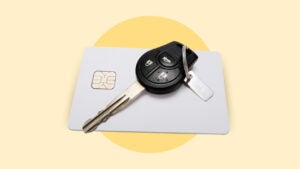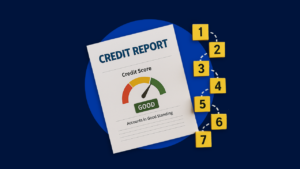Can anyone check my credit without permission?

Key takeaways
- The Fair Credit Reporting Act protects consumer privacy in part by limiting who is allowed to view your credit report and why.
- Because your credit report contains private information, those who want to view it must have a reason that falls under the FCRA’s “permissible purposes,” regardless of whether they’re pulling a hard credit check or a soft one.
- But that doesn’t mean your permission is always needed before a credit check — if someone is performing a hard credit check, they have to ask for permission, but if someone is performing a soft credit check, they don’t have to ask for permission.
When it comes to your credit report, who is allowed to view it? Can anyone look it up at any time? Can your spouse get a copy of your credit report in order to get some leverage against you during divorce proceedings? Or, when shopping for a car, can a car dealer run a credit check on you without your permission?
The short answer is no — a car salesman or soon-to-be-ex-spouse can’t get a copy of your credit report without permission, and that’s due to the Fair Credit Reporting Act (FCRA). This act aims to protect consumer privacy and to “prevent an undue invasion of the individual’s right of privacy in the collection and dissemination of credit information.”
But even though your right to consumer privacy is protected by this act, you might still run into situations where someone is legally allowed to view your full credit report without your permission. You’ll also run into situations where someone can check your credit as part of a soft credit inquiry without permission.
Let’s take a look at those situations so you know what to expect and who’s able to check your credit.
Hard inquiry vs. soft inquiry
Before diving into who can view your credit report and when, you’ll need to understand the different ways that others can check your credit. To check your credit, a person can either perform a hard credit inquiry or a soft credit inquiry.
A hard credit inquiry, also called a hard credit pull or credit check, is typically used for lending purposes. So, if you’re applying for a credit product like a new credit card or a car loan, your potential lender will perform a hard credit inquiry to see your full credit report, which will impact your score. They must ask you permission to perform this kind of inquiry, however.
A soft credit inquiry, on the other hand, is about gathering information. If you’re trying to get preapproved for one of today’s best credit cards, for example, a lender will perform a soft credit inquiry to show you your approval odds. This kind of inquiry doesn’t impact your credit score, and the person requesting it doesn’t need your permission to run it — though most of the time, lenders will still ask.
Who can check your credit without your permission?
Those who are performing soft credit inquiries can check your credit without permission, though they will often notify you regardless. People who might have reason to perform a soft credit check on you include:
- Potential landlords
- Potential employers
- People who are running background checks on you
- Lenders who want to send you preapproved offers
In some instances, however, those who are performing hard credit inquiries can also legally check your credit without your permission. This typically only happens when debt collection issues, government agencies or court orders are involved. For example, someone can perform a hard credit inquiry on your credit report without permission if:
- They are a debt collector trying to verify what you owe
- A state or local child support enforcement agency certifies to a credit bureau that they have a need to obtain your credit report
- An agency managing a state plan under the Social Security Act requests it to set up a child support award
- A court order or subpoena to obtain your credit report was issued to a credit bureau
Preapproved offers and your credit
Financial institutions will sometimes obtain a list of consumers who meet specific preliminary credit criteria in order to prescreen them before making a credit or insurance preapproval offer. This sort of consumer report allows the lender to focus their marketing efforts on consumers who are more likely to meet their credit standards.
The FCRA allows financial institutions to obtain this type of list from a credit reporting bureau unless you have specifically opted out of participating in such prescreened offers. These sorts of inquiries show up as a soft credit inquiry and will not impact your credit score.
If you decide to apply for the financial product that you were preapproved for, however, the lender or insurer would likely perform a hard credit inquiry before making a final decision on your application, which will impact your credit score.
Keep in mind: Preapprovals do not mean you’re guaranteed to be approved for a product. A lender can still deny your application even if they preapprove you for a financial product, so think carefully before submitting your application and allowing them to perform a hard credit check.
Who needs to get your permission in order to check your credit?
Those who want to perform a hard credit inquiry on your credit report will typically need your permission first before doing so, unless they fall into one of the exceptions we’ve outlined above. You might see hard credit inquiry requests from:
- Credit card issuers after you apply for a new card or request a credit limit increase
- Lenders after you apply for a mortgage, auto loan or personal loan
- Insurance companies while underwriting a policy
Legally allowed reasons for credit report access
Regardless of whether someone is trying to perform a soft credit check or a hard credit check, they can’t do so without a good reason. The FCRA lays out the “permissible purposes” for which an individual or entity can access your credit report. In addition to the purposes mentioned previously, such as having your credit checked when applying for a loan, getting preapproved offers or starting a new job, a credit bureau could provide a copy of your credit report for a variety of other reasons outlined by the FCRA. These reasons might include:
- You applying for a license or other government benefit that requires checking on your eligibility to receive it
- Potential investors or service providers and current insurers wanting to access your credit report to gauge any credit risk that your loan poses, or to determine whether you will prepay (pay off a loan before it is due)
- Those in connection with a business deal you initiated having a genuine need to review your credit
- The Federal Deposit Insurance Corporation or the National Credit Union Administration requesting your credit report in some circumstances
Keep in mind: A lender cannot obtain your credit report stating that it is for the purpose of deciding whether to grant you a loan and then use the information for other purposes. Doing so violates your rights under the FCRA.
Your FCRA rights regarding unauthorized credit report access
The FCRA holds liable any credit bureau personnel who provide a copy of your credit report to unauthorized persons. The FCRA also holds accountable those who obtain your credit report without a “permissible purpose” as outlined by the FCRA.
What happens if a credit bureau provides your credit report to someone by accident?
A credit reporting bureau is not off the hook if they provide your credit report for a permissible purpose by mistake, such as if they released your credit report because you have the same name as somebody else whose credit report was sought. Instead of just going by name, the credit bureau should also use other information to determine that it is indeed providing a report for the right person.
It would also still be an FCRA violation if a credit reporting agency issues a disclaimer stating that it is providing a credit report based purely on name-matching and it is up to the user to make sure that the report belongs to the right person.
Can you sue someone for violating your FCRA rights?
In addition to invasion of privacy, consumers could suffer from emotional and reputational harm as well as financial fallouts if someone gets unauthorized access to their credit report. That’s why you could be awarded both actual damages and punitive damages if you sue someone who uses your credit report without a “permissible purpose” and prevail. Your attorney fees could also be covered.
There is a statute of limitations in such cases. If you would like to pursue a lawsuit under the FCRA, you will have to do so within two years of the date you found out about the violation or within five years of the actual date of the violation, whichever is sooner.
How to see who’s checked your credit report
To find out who has checked your credit, simply request a copy of your credit report from Equifax, Experian and TransUnion. You can go to the government-run website www.AnnualCreditReport.com to get free weekly credit reports. Once you have your credit reports, look at the “inquiries” section to see what companies or individuals have run credit checks.
If you get credit monitoring services, you can also sign up for alerts that will tell you when an inquiry has been run on your report.
The bottom line
Your credit report can’t be obtained by just anyone, even if they want to perform a soft credit check instead of a hard one. The FCRA lays out in what situations a credit reporting bureau can provide others access to your report. Even those who want access to your report can only ask for it if they have a legally permissible reason to do so.
Both the credit reporting bureau and the person seeking access without a “permissible purpose” can be held liable if they breach the FCRA. And if you decide to pursue such a case, you will have to act before a statute of limitations runs out.
To find out who’s checked your credit recently and to stay on top of future inquiries, review your credit reports often. You can request free copies from each of the credit bureaus or use www.AnnualCreditReport.com.
Why we ask for feedback Your feedback helps us improve our content and services. It takes less than a minute to complete.
Your responses are anonymous and will only be used for improving our website.







